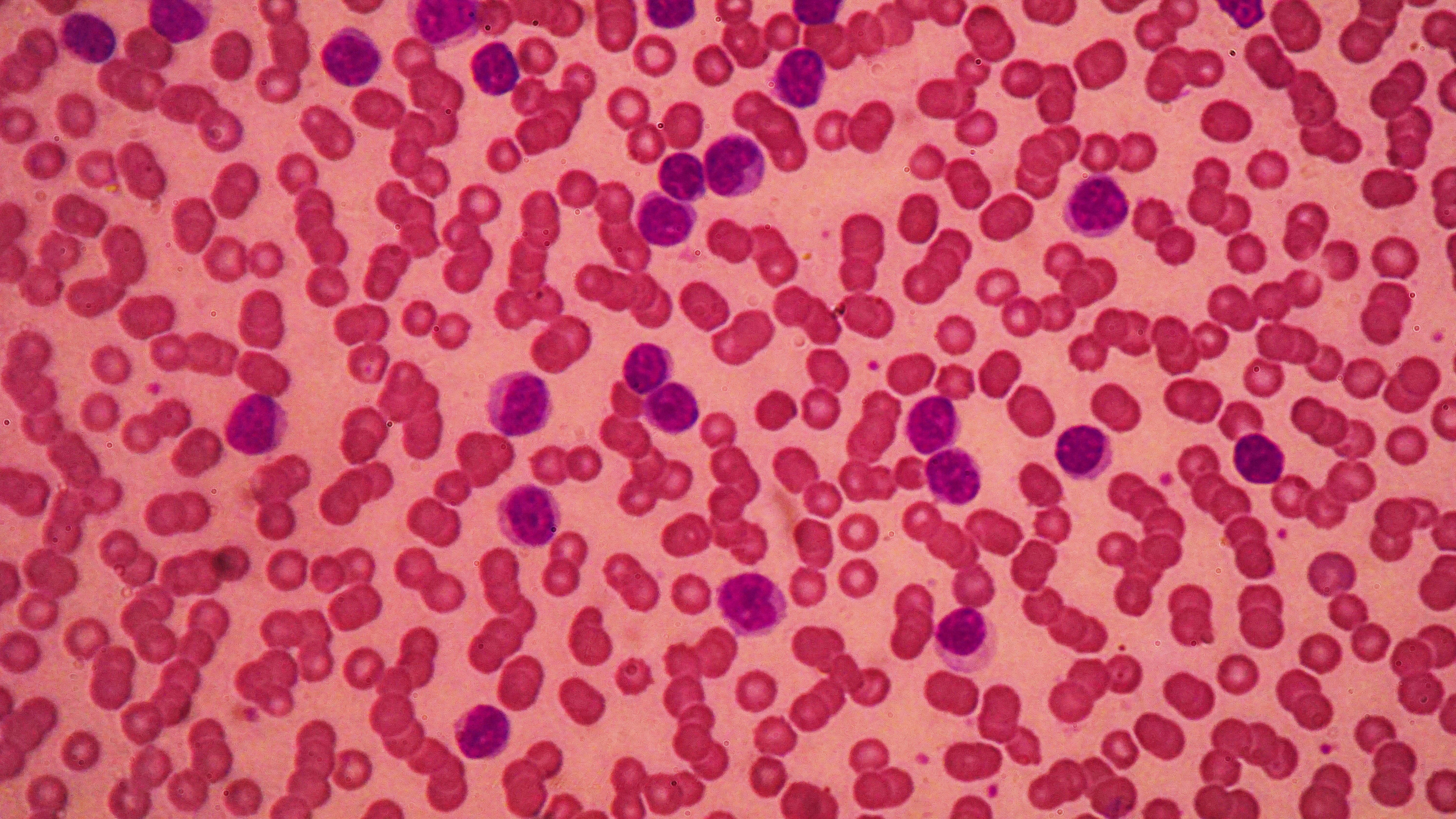Venetoclax/Umbralisib/Ublituximab Combo Yields High uMRD Rates in CLL
The rate of undetectable minimal residual disease at 10-4 in bone marrow was 77%, including a 71% rate among 14 patients with chronic lymphocytic leukemia refractory to prior Bruton tyrosine kinase inhibitors treated with venetoclax, umbralisib, and ublituximab.
CLL_ChronicLymphoblasticLeukemia_Shutterstock_399581491.jpg

The combination of time-limited venetoclax (Venclexta) with umbralisib (Ukoniq) and ublituximab (Briumvi) was safe and led to encouraging efficacy results in patients with relapsed/refractory chronic lymphocytic leukemia (CLL), including patients who were previously treated with a covalent Bruton tyrosine kinase (BTK) inhibitor, according to findings from a phase 1/2 study (NCT03379051).1
Findings showed that the intent-to-treat overall response rate for patients with CLL was 98%. A total of 100% of evaluable patients responded and 38% were complete responses. The end of treatment rate of undetectable minimal residual disease (uMRD) at 10-4 in bone marrow was 77% (30 out of 39), including a 71% uMRD rate among 14 patients refractory to prior BTK inhibitors.
For safety, adverse events (AEs) included diarrhea in 50% of patients, and AST and/or ALT elevation in 15 patients (33%). Additionally, 11% of patients had grade 3/4 diarrhea and 3 (7%) patients had grade 3/4 AST and/or ALT elevation. Tumor lysis syndrome (TLS) related to venetoclax was not seen among any patients enrolled.
About the Phase 1/2 Study
The study combined the BCL-2 inhibitor venetoclax with ublituximab, an anti-CD20 monoclonal antibody, and umbralisib,PI3K-Delta inhibitor. Combined PI3K and BCL-2 inhibition often leads to synergistic antitumor effects. Therefore, investigators examined the feasibility of response-adapted, time-limited therapy to optimize disease control through the development of a phase 1/2 trial.
The study sought to determine the safety and efficacy of venetoclax combined with umbralisib and ublituximab in 46 patients with relapsed/refractory CLL and 5 patients with Richter's transformation while mitigating the risks of prolonged treatment.
Patients aged 18 years and older with a confirmed diagnosis of B-cell CLL or non-Hodgkin's lymphoma who were refractory to or relapsed after at least 1 prior treatment regimen and who had an ECOG performance status of0 to 2 were eligible for inclusion. The trial, which was completed in June 2022, enrolled patients in Ohio, New York, and Illinois.2
In the first arm, patients were treated with ublituximab at a fixed dose given via intravenous (IV) infusion on days 1, 8, and 15, followed by maintenance infusions of umbralisib and oral venetoclax given daily. In the second arm, ublituximab was given at a fixed IV infusion dose on days 1, 8, and 15, which was followed by maintenance infusions of umbralisib and lenalidomide, both of which were given on days 1-21 every 28 days. For patients who achieved uMRD after 12 cycles, treatment was stopped.
The primary end points of the trial were overall response rate, complete remission rate, and MRD.
REFERENCES:
Hill BT, Ma S, Zent CS, et al. Response-Adapted, Time-Limited Venetoclax, Umbralisib and Ublituximab for Relapsed/Refractory Chronic Lymphocytic Leukemia [published online ahead of print, 2023 Oct 23]. Blood Adv. 2023;bloodadvances.2023010693. doi:10.1182/bloodadvances.2023010693
Phase I/II study of venetoclax or lenalidomide in combination with ublituximab and umbralisib in subjects with relapsed or refractory CLL/SLL and NHL. ClinicalTrials.gov. Updated August 22, 2023. Accessed November 14, 2023. https://clinicaltrials.gov/study/NCT03379051?tab=table
Selection of Next-Gen BTK in CLL Limited By Lack of Direct Comparison
February 4th 2025During a Case-Based Roundtable® event, Nakhle Saba, MD, and participants discussed the data supporting the 2 newer BTK inhibitor therapies acalabrutinib and zanubrutinib in patients with chronic lymphocytic leukemia who received 1 prior line of therapy in the second article of a 2-part series.
Read More